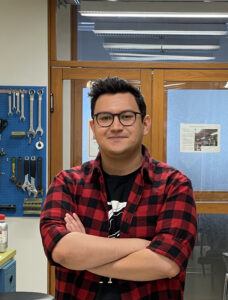19.1.2024
Doctoral Thesis on the Development of Sustainable and Renewable Lignin-Derived Fuels

M.Sc. (Tech.) Mark Martínez-Klimov’s doctoral thesis in Industrial Chemistry and Reaction Engineering will be put forth for public defence at the Faculty of Science and Engineering at Åbo Akademi University.
The thesis is entitled Hydrodeoxygenation of lignin-derived model compound for sustainable aviation fuel production using bifunctional catalysts.
The public defence of the doctoral thesis takes place on 26 January 2024 at 1PM in auditorium XXII, Agora-building, Vesilinnantie 3, Turku. Professor David P. Serrano, IMDEA Energy Institute, Spain will serve as opponent and Professor Dmitry Murzin, Åbo Akademi University, as custos.
Summary
The development for sustainable and renewable fuels is driven by the current reliance on fossil fuels and a need to reduce contaminant gas emissions and adhere to climate-related regulations. The main challenge for the aviation industry in particular is the transition towards cleaner energy sources. A promising solution is manufacturing hydrocarbons from renewable sources, minimizing the environmental impact and high costs required for alternative green technologies.
Lignin is considered as a promising source of materials and biofuels, as it can be transformed through various thermochemical processes to valuable products. To obtain liquid hydrocarbons, lignin needs to undergo pyrolysis, resulting in bio-oil, which requires additional upgrading due to its low heating value, high viscosity, and acidity. Hydrodeoxygenation can be used to remove the oxygen groups, obtaining hydrocarbons compatible with the existing infrastructure.
For the first time studies simulating industrial catalysts and eventual scaling-up were performed for a lignin-derived model compound, isoeugenol, in batch and continuous reactors using powders and shaped catalysts, respectively. A series of bimetallic platinum-rhenium catalysts supported on mesoporous and activated carbon were studied, with the purpose of revealing the role of both metals for hydrogenation and deoxygenation. The results indicated that a higher rhenium loading resulted in improved activity, providing the oxygen vacancies required for deoxygenation.
A second series of catalysts comprising platinum as the active metal, zeolite beta and a binder were also studied. The proximity of platinum to acid sites enhanced considerably catalytic activity, resulting in ca. 20% higher conversion when platinum was deposited on the zeolite rather than only on the binder. The extrudates displayed good stability, with a slight decrease in catalytic activity after 30 hours of reaction time.
Mark Martínez-Klimov was born in 1992, Mexico City, Mexico. He can be reached by email mark.klimov@abo.fi.
The doctoral thesis can be read online through the Doria publication archive.
